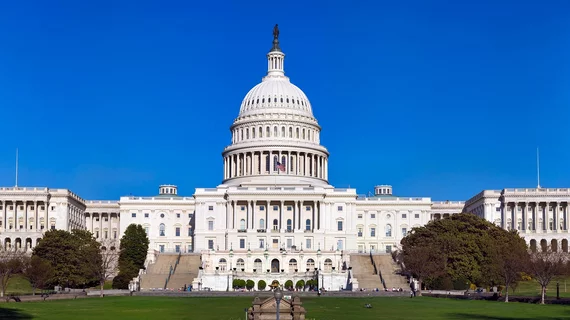14 House members—7 Democrat, 7 Republican—press CMS to step up its game on CCTA
A bipartisan group in the U.S. House of Representatives is asking the Centers for Medicare and Medicaid Services to acknowledge the cost-effectiveness of coronary CT angiography (CCTA) by comprehensively covering the exam for patients who present with acute but stable chest pain or other early signs of arterial plaque buildup.
In a letter sent Oct. 25 to CMS head Chiquita Brooks-LaSure, an even split of Republicans and Democrats, 14 in number, amplify new guidelines from the American College of Cardiology (ACC), American Heart Association (AHA), Society of Cardiovascular Computed Tomography (SCCT) and other groups.
Those guidelines, published a year ago in the Journal of the American College of Cardiology, distinguished CCTA with a Class 1 recommendation and an evidence level of “A” for patients with stable and acute chest pain.
Since then, demand has been growing for CCTA—which yields 3D visualization of blood flowing through arteries to the heart—as a frontline noninvasive test for patients with suspected coronary artery disease.
Moreover, the signatories of the letter to CMS point out, the new guidelines were published “in response to overwhelming clinical evidence demonstrating that use of CCTA leads to a 41% lower rate of death and heart attack compared to stress testing, allows clinicians to cancel greater than 75% of planned invasive procedures and saves the Medicare program more than $3,100 per patient.”
More:
Yet, despite multiple guidelines from the U.S. and Europe recommending CCTA as the preferred imaging modality for patients, hospitals have not adopted this service at levels expected for the standard of care. In fact, CMS’ own data indicates that Medicare beneficiaries are up to 20 times more likely to receive a stress test. Reimbursement for these costly alternatives is over seven times greater than CCTA, which makes it hard for hospitals to invest in a service line that loses revenue when significantly more profitable alternatives exist.”
A Congressman’s Firsthand Patient Experience
The campaign to win CMS’s buy-in on the benefits of CCTA is being led by California Democrat Ted Lieu. For him the project is personal.
In a video recorded for SCCT’s 2022 scientific meeting in July, Lieu tells how CCTA alerted his care team to the advisability of stent surgery.
Notably, the test was only performed on a “just in case” basis when Lieu had significant chest pain—and blood tests, EKGs and echocardiography all came back negative.
Meanwhile the CCTA, Lieu recalls in the video, showed significant arterial narrowing.
He went ahead and received the preventive stenting procedure.
At some point during the episode of care, it occurred to him that “there are a lot of Americans who never would have gotten that cardiac CT test,” Lieu says. “They just would’ve gotten the EKG and left or an ultrasound and left. And one reason for that is, as all of you know, the Medicare reimbursement rate has fallen 30% for coronary CT angiography. I think we need to increase funding for CCTA.”
Hence Lieu’s lead role in rallying support from both sides of the aisle to sway CMS.
‘Put Medicare Beneficiaries First and Support This Value-Based Approach’
The Oct. 25 letter fleshes out some particulars of the applicable CPT codes and compares current CCTA reimbursement calculations to those for several non-cardiac CT exams within the same coding family.
The authors note that some of these are less involved than CCTA and use fewer resources, to boot.
“These procedures assigned to APC 5572 do not require a special technician, EKG gating, medication prior to or during the exam, monitoring of patients, special software for interpretation, and take less time to perform than a cardiac CT,” the authors write. “We hope CMS will closely examine the resources and time required to perform these procedures relative to those required for cardiac CT.
The letter also appeals to HHS’s concerted effort of recent years to improve healthcare access to historically underserved populations.
“As Members of Congress representing diverse populations across the U.S., we share the administration’s concerns regarding health equity and believe that CCTA can help address inequities in cardiac care for communities of color,” the representatives write. “Studies demonstrate that mortality from cardiovascular diseases, including CAD, is 33% higher for Black individuals compared to the overall population and that Native Americans have a nearly 20% higher cardiovascular mortality rate compared to white individuals.”
More:
As CMS maintains the legal authority to modify the ambulatory payment classifications placement of [the applicable CPT codes], we hope you will make this much-needed change to increase [CCTA] access, reduce the use of unnecessary tests and improve health equity, all while saving Medicare money. We encourage CMS to put beneficiaries first and support this value-based approach to improve quality, access and affordability for our constituents.”
Along with Lieu, signatories include Mark Amodei (R-NV), Jake Auchincloss (D-MA), Sanford Bishop (D-GA), Larry Bucshon, MD (R-IN), Tom Cole (R-OK), Andy Harris (R-MD), Mike Kelly (R-PA), Jimmy Panetta (D-CA), Terri Sewell (D-AL), Kim Schrier, MD (D-WA), Adrian Smith (R-NE), Mike Thompson (D-CA) and Joe Wilson (R-SC).

